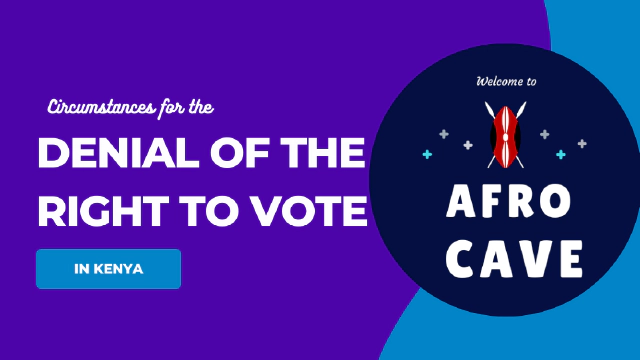Article 83 of the Kenyan Constitution provides every eligible citizen with the right to register as a voter in Kenya. The law also emphasises that no eligible citizen shall be denied the right to vote. However, there are circumstances where the denial of the right to vote in Kenya may occur.
The right to vote in Kenya being enshrined in the Constitution means that every citizen can participate in the democratic process that is voting. Eligible voters in Kenya vote for six positions on the same day.
The positions are those of the President (and the Deputy President), the Members of the Senate, the Members of the National Assembly, the Women Representatives, the County Governors (and the Deputy County Governors) and the Members of the County Assembly (or Ward Representatives).
There are different types of elections in Kenya that eligible voters may participate in. Citizens living both inside and outside Kenya have the right to vote and also to be registered and appear in the register of voters.
Table of Contents Show/Hide
Denial of the Right to Vote in Kenya
The circumstances that may lead to the denial of the right to vote in Kenya include the following:
1. Not a citizen of Kenya
A person may be denied the right to vote in Kenya if the person is not a citizen of Kenya. There are three ways to become a citizen of Kenya which are by birth, registration or naturalisation. Proof of a national identification card (ID) or a valid Kenyan passport is required to vote in Kenya.
Therefore, if a person is not a citizen of Kenya, they cannot vote in elections.
2. Not of the majority age
If anyone is below the age of eighteen, they are not eligible to vote in Kenya. Minors therefore cannot vote since the voting age in Kenya is 18 years and above. Evidence of being an adult is either a national identity card (ID) or a valid Kenyan passport.
3. Not of sound mind
Being of sound mind means a person can think, understand and reason for themselves. Adults are generally considered to be of sound mind unless circumstances change. Therefore, a person of unsound mind can be denied the right to vote in Kenya.
4. Convicted of an election offence
The denial of the right to vote in Kenya applies to anyone convicted of an election offence in the preceding five years.
5. Wrong place of registration
If a voter presents themselves in a polling station that is different from the one they registered at, then they can be denied the right to vote. Every voter shall ensure they present themselves at the polling station that they registered at.
6. Double voter registration
If someone is discovered to have registered twice in the voters’ register, then that person can be denied the right to vote.
7. No Identification
During the election day, if a person does not have their national identification card (ID) or a valid Kenya passport they registered with, or if either of these documents is defective, they can be denied the right to vote.
8. No name in the voters’ register
If a person’s name is missing from the voters’ register, then that person can be denied the right to vote. Therefore, it is important to register as a voter during the voter registration process.
9. Time barrier
If a person presents themselves at a polling station outside the assigned voting hours during the election day, they can be denied the right to vote.

